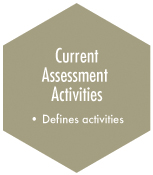Current Assessment Activities

Current assessment activities include information on a full range of projects and activities recently completed or currently underway to gauge student learning, make improvements or respond to accountability interests.
What We Do in Assessment
Assessment Grants
Assessing student learning is an essential component of general education and in the major. Assessment grants support innovative practices in the assessment of student learning and are intended for faculty in their efforts to support and assess student learning in public affairs and general education.
- Assessment grant applications are now open!
- Since the Summer of 2017, 53 assessment grants have been awarded to curricular and co-curricular programs with qualifying assessment projects.
Consultations
The Office of Assessment and Accreditation strives to be a valuable thinking partner to faculty and staff to help further student success. Our office offers one-on-one consultations at all levels of the university—College, Department, and Program. We encourage any faculty member who has a question regarding assessment to contact a member of our team, Mark Woolsey or Mary Bohlen to schedule a consultation.
Higher Learning Commission (HLC) Oversight Committee to the Provost
The Office of Assessment coordinates an oversight committee to help keep the Provost abreast of the assessment activities occurring on campus in response to the recommendations of the HLC. This committee gathers, organizes, and evaluates evidence of assessment at all levels of the university.
Oversee the Undergraduate Exit Survey (Formerly the University Exit Exam and GEN 499)
Assessment oversees the administration and evaluation of the Undergraduate Exit Survey. Student responses to the Exit Survey are evaluated by university committees as well as individual colleges and departments. Results of these evaluations and student responses inform instruction and planning decisions across the entire university. Undergraduate students at Missouri State who have successfully completed 102 or more credit hours are required to complete the Exit Survey prior to graduation.
Assessment of Student Learning Workshops
Public Affairs assessment is a non-intrusive system for assessing (not grading) student work related to the Public Affairs mission. Assessment will gather student work across disciplines so we may begin to acknowledge students' understanding and integration of the themes of the Public Affairs mission and our diversity goals.
The 2020-2024 Annual Assessment Workshops were held each spring in late May.
- They were geared toward graduate programs working on assessment of student of learning including but not limited to, reviewing comp exam questions, learning outcomes, and discussing student work.
Institutional Surveys
National Survey of Student Engagement (NSSE)— It's that time of year again! NSSE will be administered Spring 2025. Invitations will be sent out February, and the survey will close in May. For participating, students will be entered to win one of several prizes including bookstore gift cards and an iPad. NSSE measures how students spend their time and what they gain from attending college. At Missouri State University, NSSE was recently administered to first-year and senior students in Spring 2022.
Beginning College Survey of Student Engagement (BCSSE)— Missouri State University recently administered the BCSSE to samples of incoming students in Summer 2024. BCSSE is administered to incoming students prior to the start of fall classes and is paired with a NSSE administration at the end of the first college year.